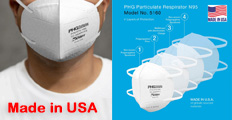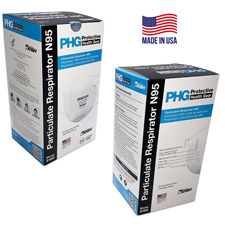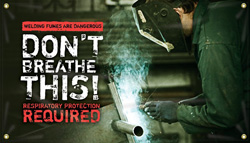



Find all of your laboratory and workplace safety supplies at Safety Emporium!
 Ingestion |
 Glossary Index |
 Intraperitoneal |
| MSDS Topics |
Free Sites | FAQ's | Regulations | Glossary | Software | Suppliers |
| Books | Forum | Poll | Fun stuff | Quiz | Store | |
| Understand your MSDS with the MS-Demystifier | Search ALL our MSDS info | |||||

Get your PPE such as made in USA NIOSH-approved N95 masks from Safety Emporium.
Inhalation is the drawing of air or other substances (fumes, mists, vapor, dust etc.) into the lungs (the respiratory system). An easier definition is "breathing in".
The act of inhaling and exhaling is called respiration or, more simply, "breathing".
Inhalation of hazardous materials affects the body in two ways. First, there can be irritation, allergic reaction or other damage to the lungs, respiratory tract, and/or mucous membranes. Second, the foreign substance may be absorbed into the bloodstream in the lungs and then distributed through the body.
Avoid inhaling anything other than clean air. Even if a substance is not listed as hazardous, inhaling dusts etc. can irritate the lungs. Chronic (long-term) inhalation of such substances can lead to permanent damage including bronchitis, emphysema or pneumoconiosis. Likewise, inhalation of sea water can lead to life-threatening acute respiratory distress syndrome (ARDS) (see Further Reading below). And, of course, tobacco products kill.
Even substances such as food flavorings that you would think could be harmless to inhale can cause severe lung damage. One of the first examples of this was severe lung damage found in workers who inhaled large quantities of diacetyl, a substance used to flavor microwave popped corn. More recently, an outbreak of lung injuries associated with e-cigarette use (vaping) has been reported. It's critical to understand that virtually no food flavoring has ever been tested for inhalation safety and yet manufacturers continue to put these untested and potentially deadly products on the market. See the NIOSH alert under Further Reading for additional information.
Always remember to use appropriate engineering controls such as fume hoods and proper ventilation when planning work in which hazardous materials could be inhaled. If these means are not sufficient, be sure to use appropriate personal protective equipment (PPE) such as an appropriately-selected respirator.
Welders should pay close attention to the potential for metal fume fever which can be caused by inhalation of welding fumes. See the Further Reading links in our fumes glossary entry for more information and resources.
Inhalation is one of the four routes of entry often discussed on a Safety Data Sheet (the other three are ingestion, absorption, and injection). You will inhalation hazard information in Section 11 (toxicological information) of the SDS and Section 8 (exposure controls/personal protection) will describe methods you can take to avoid exposure such as engineering controls and personal protective equipment such as respirators.
In the event these controls fail, Section 4 (first-aid measures) will explain the symptoms of inhalation (and other) exposure and indicate what type of medical attention will likely be necessary. Obviously, for inhalation exposures, one of the first steps is to remove the victim to fresh air.

Welding fumes pose a significant inhalation hazard. Remind your employees with safety banners from Safety Emporium.
See also: bronchitis, edema, respirator, smoke.
Additional definitions from Google and OneLook.
Entry last updated: Monday, January 2, 2023. This page is copyright 2000-2025 by ILPI. Unauthorized duplication or posting on other web sites is expressly prohibited. Send suggestions, comments, and new entry desires (include the URL if applicable) to us by email.
Disclaimer: The information contained herein is believed to be true and accurate, however ILPI makes no guarantees concerning the veracity of any statement. Use of any information on this page is at the reader's own risk. ILPI strongly encourages the reader to consult the appropriate local, state and federal agencies concerning the matters discussed herein.